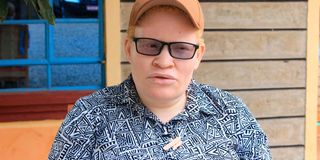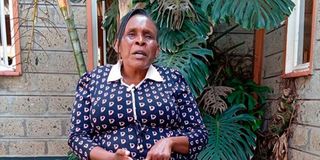The women with disability breaking Kenya’s political glass ceiling

From left: PWDs Barnish Mukami, Halima Shariff and Betty Taany.
What you need to know:
- Despite facing discrimination, sexual harassment and cultural barriers, women with disabilities are breaking into politics.
- Halima Shariff transformed from a restaurant owner to a political force in Kajiado, representing her community despite cultural and ethnic barriers.
- Barnish Mukami, a teacher living with albinism, challenged discrimination in Embu's political arena, turning her Sh15,000 salary into a powerful campaign.
- Betty Taany, disabled by polio at age three, pushed through the transformative Disability Mainstreaming Bill Act.
The sun sets over Ongata-Rongai, casting long shadows across the dusty streets as the scent of cardamom and simmering stews drifts from a modest restaurant. Inside, the rhythmic clatter of plates mingles with animated conversations in Swahili and Maa.
Behind the counter, Halima Shariff's wheelchair glides smoothly across the well-worn floor as she orchestrates the evening rush with practiced precision. Her restaurant may be small, but her dreams stretch far beyond these walls – all the way to the corridors of power in Kenya's political arena.

Halima Shariff at her restaurant in Ongata-Rongai town on September 10, 2024. She ran for Kajiado Woman Representative in 2022.
In 2022, Halima embarked on an ambitious journey to become Kajiado's Woman Representative, a quest that would reveal the deep-seated challenges faced by women with disabilities in Kenya's political landscape. Her story, along with those of other remarkable women, illuminates the intersection of gender, disability, and political ambition in a country grappling with social transformation.
"Being a woman living with disability in the political space comes with its unique challenges," Halima reflects, her voice steady despite recounting difficult memories.
"People tend to view you as somehow less capable, less 'normal.' Even though I was born and raised in the Maa community and speak their language fluently, I faced constant reminders that I didn't quite belong."
The accident that left her disabled in 2013 transformed her physical reality but strengthened her resolve to effect change. Yet, on the campaign trail, she encountered resistance that cut deeper than physical barriers.
"I was blatantly told that I wasn't Maasai enough and should instead seek positions in Wajir or Mandera," she recalls, her hands gripping the wheels of her chair.
"The discrimination took its toll. There were days on the campaign trail when the weight of this mistreatment felt almost unbearable."
Two hundred kilometres northeast, in the cool highlands of Embu, another story of resilience unfolds. Barnish Mukami, a teacher of English and Literature teacher at Itambua Secondary School, stands out not just for her albinism, but for her unwavering determination to reshape local politics.

Barnish Mukami speaking to Nation.Africa in Kiriari village, Manyatta Constituency, Embu County, on August 2, 2024. She ran for Ruguru-Ngandoni Ward MCA seat in 2022.
The morning sun filters through the classroom windows as she recalls her 2022 campaign for the Ruguru-Ngandoni MCA position in Manyatta Constituency.
"Growing up, I faced relentless stigma," Mukami tells Nation.Africa, her voice carrying the weight of years of discrimination.
"Teachers, students, parents, and even relatives treated me differently. The journey through education was particularly challenging, but it strengthened my resolve to fight for the rights of people living with disabilities, especially women."
The campaign trail presented its own set of obstacles.
"People would approach me with doubt in their eyes," she remembers.
"They would outright question whether I was capable of leading, simply because of my condition. The elders' scepticism was particularly painful. Even the weather became a barrier – my sensitivity to sunlight meant I could only campaign in the evenings and at night."
Perhaps most disturbing were the encounters with party officials who attempted to derail her ambitions.
Bear child
"Before the party primaries, officials approached me, demanding I step down in favour of another aspirant," Mukami reveals.
"They promised me a nomination seat in the Embu County Assembly, but it was an empty promise. One official even had the audacity to demand I bear his child in exchange for the position."
Financial constraints added another layer of difficulty. Working as a casual employee in the local MP's office, earning a modest Sh15,000 monthly salary, Mukami struggled to mount a competitive campaign.
"I saved what I could, but it was just a drop in the ocean compared to what was needed," she explains.
The challenges these women face are systemic, rooted in both cultural norms and institutional barriers.

Betty Taany, a nominated MCA at Kajiado County Assembly, during an interview in Kajiado town on September 10, 2024.
Betty Taany, a nominated MCA at the Kajiado County Assembly, knows these obstacles intimately. Having contracted polio at age three, she has spent her life advocating for the rights of people with disabilities.
"The assembly chamber can be an intimidating space," Betty admits, her voice carrying the confidence of someone who has learned to command respect. "As both a woman and a person living with disability, you have to fight twice as hard for your voice to be heard. But now, both male MCAs and women treat me with respect because they know I'm a fighter."
Betty's advocacy has led to concrete change through the Disability Mainstreaming Bill Act, which mandates county government support for people with disabilities.
"The law allocates Sh50 million in the 2023-24 financial year," she explains proudly. "This funding will provide essential equipment, education bursaries, and interest-free loans to PWDs in the county."
Hope for broader change comes through initiatives like UN Women's "Expanding Spaces for Women Political Participation in Kenya" project. Implemented by Uraia Trust with funding from Global Affairs Canada, the project operates in seven counties: Samburu, Kisii, Homa Bay, Embu, Kericho, Wajir, and Kajiado.
Anna Mutavati, the outgoing UN Women Representative in Kenya, emphasises the project's significance.
"There can never be true democracy without women's voices at the table," she asserts.
"Women constitute more than half of our population – their presence in decision-making positions is crucial for inclusive budgeting and development."
The project's impact extends beyond individual candidates to reshape cultural attitudes. Joseph ole Sirai, a Maasai elder from Magandi in Kajiado West, represents this evolving mindset.
"We as Maasai elders now fully support women's participation in politics and governance," he declares. "Experience has shown us that women make excellent leaders – they're less prone to corruption and more compassionate in their approach."
Obstacles
Simon Lasiti, a Moran from Ngurumani village in Magandi, echoes this sentiment.
"Culture should no longer be used as an excuse to prevent women from seeking political leadership," he states firmly. "We've made a conscious decision to remove the obstacles that have historically blocked women's path to leadership positions."
Janine Cocker, head of Development Cooperation at the Canadian High Commission in Nairobi, sees progress despite the challenges.
"As we approach 2027, we need to project women as powerful candidates and recognise them as formidable leaders," she emphasises. "The increase in women's leadership at both national and county levels is encouraging, but there's still work to be done."
Back in her restaurant in Ongata-Rongai, Halima's determination remains unshaken. The evening crowd has thinned, but her eyes sparkle with renewed purpose as she discusses her future plans.
"The 2022 election may not have gone my way," she says, "but this isn't the end of my political journey. I'll be back in the next election, stronger and more prepared."
The sun has fully set now, but the warmth of hope lingers in the air. These women's stories – Halima's resilience, Mukami's determination, and Betty's legislative victories – illuminate a path forward. While barriers remain, from prohibitive campaign costs to entrenched cultural biases, their persistence is gradually reshaping Kenya's political landscape, proving that leadership transcends physical limitations and gender stereotypes.
As Mutavati notes, "The progress we've seen is encouraging, but the work continues. Parliament, political parties, and other relevant bodies must step up to support this cause. The future of our democracy depends on it."


